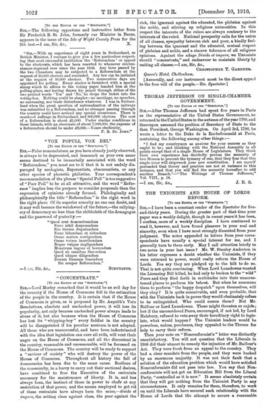"CONCENTRATE"
(To THE EDITOR OF THE " SPECTATOR.sl SIR,—Lord Morley remarked that it would be an evil day for the country if the House of Commons fell in the estimation of the people in the country. It is certain that if the House of Commons is given, as is proposed by Mr. Asquith's Veto Resolutions, absolute and unchecked power, it will lose its popularity, not only because unchecked power always leads to abuse of it, but also because when the House of Commons has lost its " whipping-boy " every faddist in the country will be disappointed if his peculiar nostrum is not adopted. All those who are unsuccessful, and have been indoctrinated with the idea that legislation can cure all evils, will vent their anger on the House of Commons, and all th3 discontent in the country, reasonable and unreasonable, will be focussed on the House of Commons. The country will be ready to support a " saviour of society " who will destroy the power of the House of Commons. Throughout all history the fall of democracies has been due to the same cause. Sections of the community, in a hurry to carry out their sectional desires, have combined to free the Executive of the restraints necessary for the maintenance of liberty. It is, and has always been, the instinct of those in power to chafe at any restriction of that power, and the means employed to get rid of these restraints have always been the same,—divide et impera, the setting class against class, the poor against the rich, the ignorant against the educated, the plebeian against the noble, and stirring up religious animosities. In this respect the interests of the rulers are always contrary to the interests of the ruled. National prosperity calls for the union of all classes, sympathy between rich and poor, a kindly feel- ing between the ignorant and the educated, mutual respect of plebeian and noble, and a sincere tolerance of all religious opinions. Against the adage Divide et impera, we Unionists should "concentrate," and endeavour to maintain liberty by uniting all classes.—I am, Sir, &c., [Assuredly, and our instrument must be the direct appeal to the free will of the people.—En. Spectator.'


























































 Previous page
Previous page